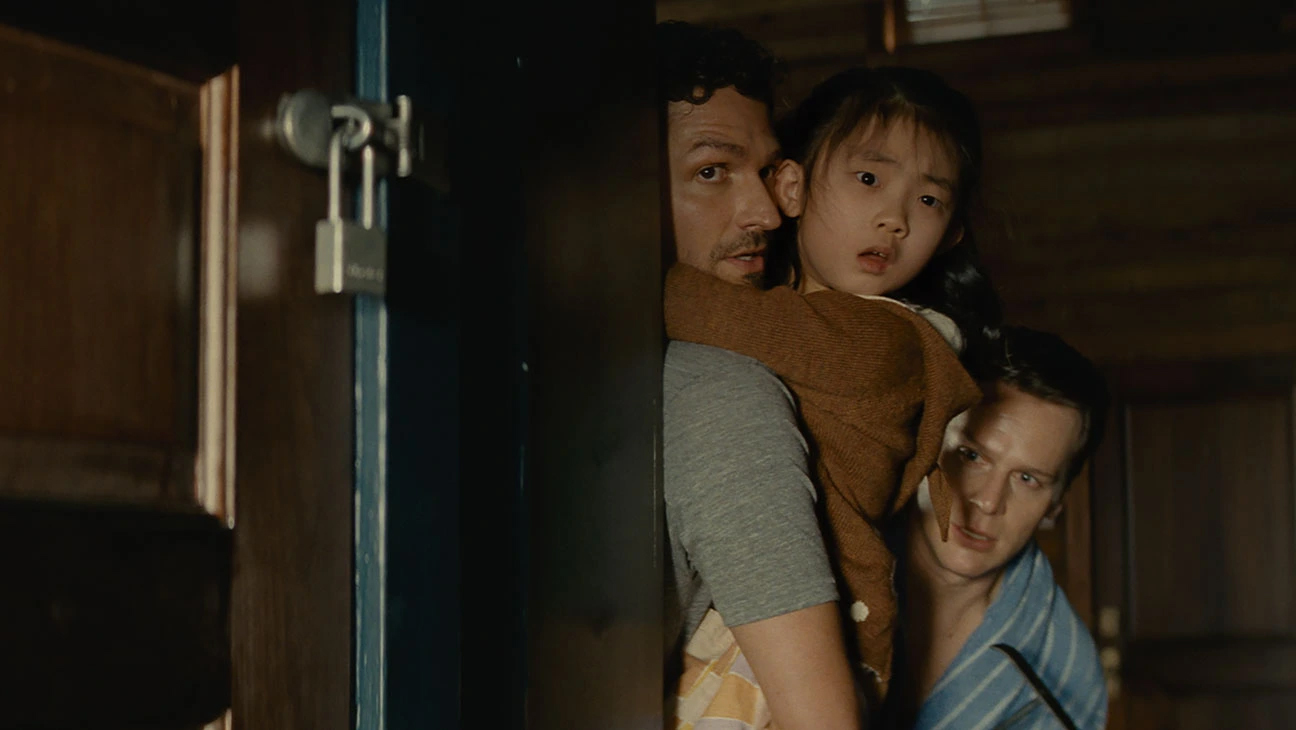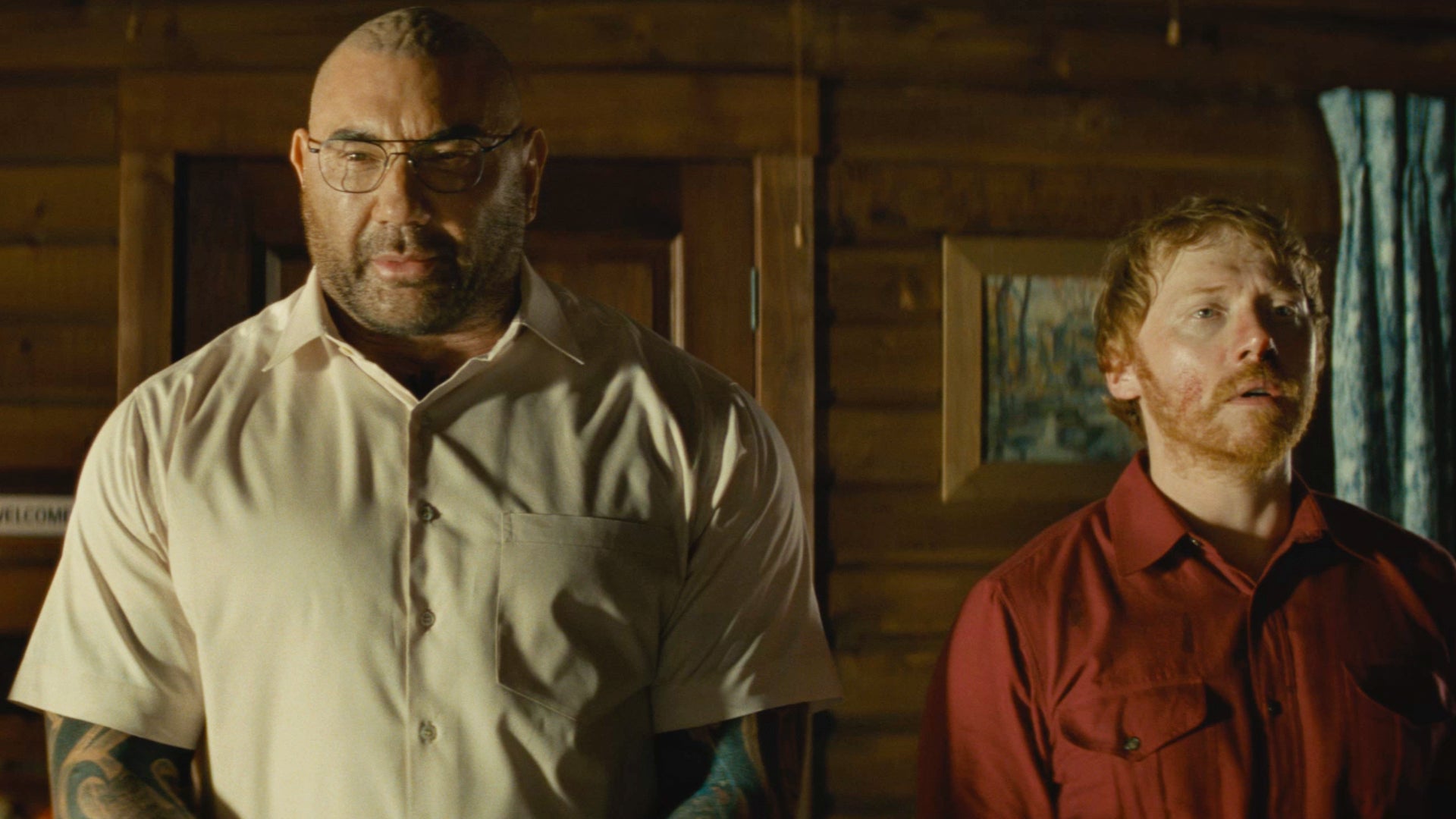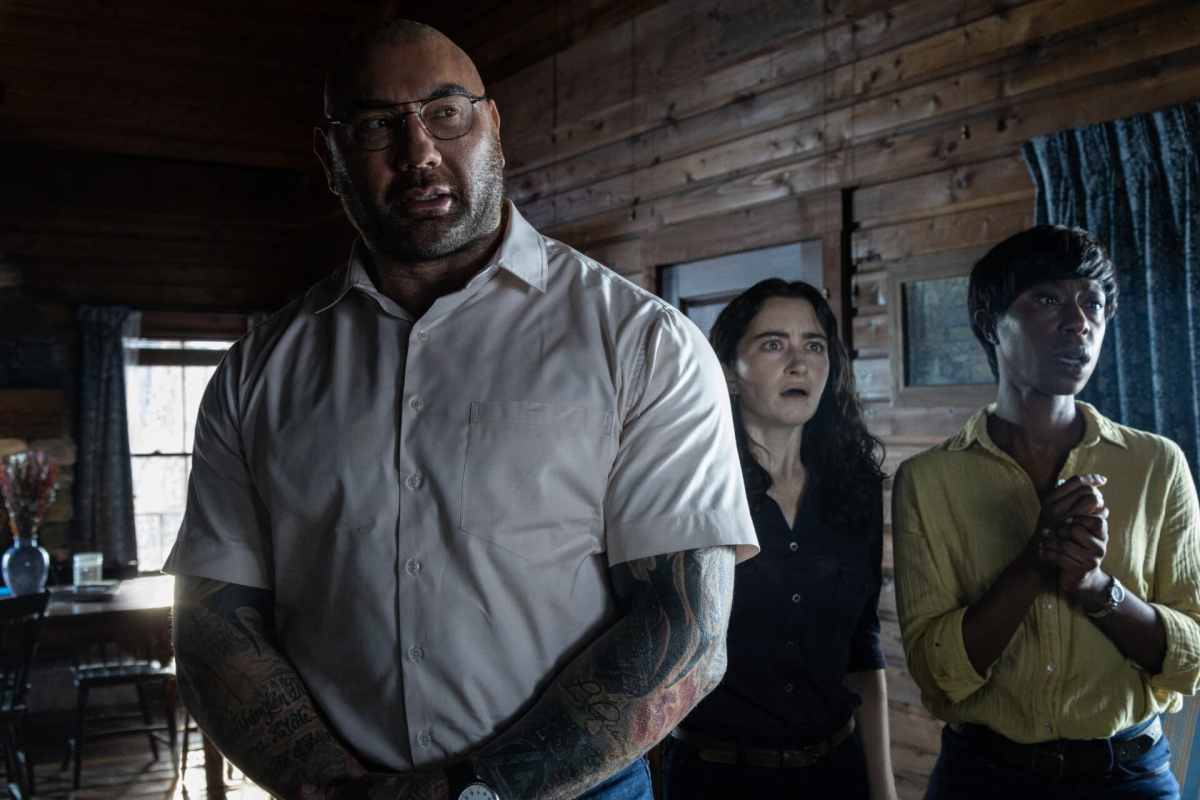This is a largely spoiler-free review of Knock at the Cabin.
Knock at the Cabin is the latest movie from director M. Night Shyamalan.
The film is an adaptation of the novel The Cabin at the End of the World by Paul G. Tremblay. Married couple Andrew (Ben Aldridge) and Eric (Jonathan Groff) have taken a vacation to their remote cabin with their daughter Wen (Kristen Cui). It’s a way of getting away from the world. The couple have built a secluded paradise together. However, in the movie’s opening scene, Wen is approached by a mysterious stranger named Leonard (Dave Bautista).
It isn’t long before Leonard and his three associates — Sabrina (Nikki Amuka-Bird), Adriane (Abby Quinn) and Redmond (Rupert Grint) — have forced their way into the cabin. Leonard presents the captive family with a horrific choice: One member must die by another’s hand, or the world will come to an end. The bulk of the movie centers on the ambiguity of this prophecy, as well as the psychological tug of war between these true believers and the family that has found themselves under siege.
In some ways, it is interesting that Knock at the Cabin is an adaptation. It is a film that aligns almost perfectly with Shyamalan’s recurring thematic fixations: the obligation that parents (and adults in general) have to children, the violation of a sheltered space, the threat of a looming apocalypse, a fractured sense of reality and the way in which that warps the world around it, and a broader meditation on the power of faith. Then again, Shyamalan has dramatically altered the novel’s ending.
Still, these are all big ideas and themes. To his credit, whatever his issues as a storyteller, Shyamalan has never been a director lacking ambition. For better and for worse, Shyamalan tends to take big swings. Sometimes those swings connect and sometimes they don’t, but there’s always a bracing excitement in his commitment to his ideas. Knock at the Cabin is a big and bold ideas-driven movie. The greatest irony is that it is also a film that works best when it goes small.

The bulk of Knock at the Cabin is a tightly contained and claustrophobic psychological thriller. Leonard holds Andrew and Eric hostage, trying to convince them of an idea that is fundamentally absurd and unverifiable, but which Leonard believes unquestioningly. It’s a premise that plays to Shyamalan’s strengths, most notably in his earlier and more popular work like The Sixth Sense or Unbreakable. Is this a delusion? How dangerous is Leonard? What if it’s not a delusion?
It helps that Shyamalan has assembled an impressive cast. Dave Bautista remains one of the most fascinating screen presences in modern Hollywood, an actor committed to working with interesting directors in roles that play somewhat against type. Leonard is obviously a very physically imposing character, but it’s his tenderness and spiritual resolve that makes him so compelling to watch. Shyamalan himself argues for Bautista as “a giant who can do 30 pages of monologues.”
The movie also makes great use of Jonathan Groff, a veteran theater performer whose breakout onscreen role in Mindhunter showcased a capacity to play both vulnerability and ambiguity. Eric is very much the conscience and soul of Knock at the Cabin, and much of the tension derives from the push and pull he feels. The entire cast of Knock at the Cabin does good work, especially Rupert Grint and Nikki Amuka-Bird in supporting roles. Kristen Cui is also very good as Wen.
Knock at the Cabin works best when it is a battle of wits and wills between this family and their captors, playing off the suspense and ambiguity of the premise. Is Leonard insane? Is this whole thing staged? Why this family? Why now? Is it a coincidence that these religious zealots have targeted a same-sex couple? The film also intercuts these tense scenes with brief flashbacks of Andrew and Eric’s relationship, which serves to ground this abstract tension in something real and tangible.

That said, the problem with Knock at the Cabin is that the premise is simply too large to maintain that level of consistent ambiguity, even across a tight 90-minutes-and-credits runtime. At a certain point, things need to start leaning one way or another. As the film progresses, it starts putting its finger on the scale, allowing its perspective to venture outside the cabin. In doing so, it shatters the claustrophobic paranoia, turning the movie into something much more conventional.
It’s to Shyamalan’s credit that he is a filmmaker who keeps his films tight. Allowing for credits, very few of his movies run longer than 90 minutes. He’s talked in interviews about how he takes that idea seriously and how he doesn’t feel that he has “earned” the right to make a two-hour movie. Knock at the Cabin begins with that conversation between Leonard and Wen that immediately generates tension. It’s an admirable quality in a genre filmmaker, to keep things lean.
However, it occasionally feels like Knock at the Cabin is a little too lean. Indeed, one might suggest that Shyamalan’s focus occasionally drifts to the wrong places, more focused on the world than the characters. Andrew and Eric aren’t drawn quite as well as they might be. There are recurring hints that Eric has a complicated relationship with his faith, an idea central to the movie. However, it is never brought into focus in a way that it needs to be for this premise to work.
Knock at the Cabin is too broadly drawn for its own good. It’s a shame, as there is a lot to like here. Like many of Shyamalan’s best movies, it is rich with atmosphere. The camera moves in interesting and engaging ways, a reminder that Shyamalan is a better visual storyteller than a narrative one. Herdís Stefánsdóttir’s score is suitably unsettling. However, Shyamalan can’t keep the central tensions of the movie wound tight enough to prevent them from unraveling towards the climax.
Knock at the Cabin has an impressive cast and a compelling hook. It’s a pleasant enough retreat, but it ultimately gets a little lost in the woods.






Published: Feb 3, 2023 03:24 pm